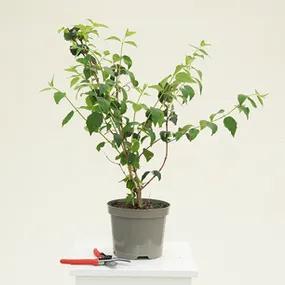Double White Mock Orange Plants
Honest Delivery PricesDouble White Mock Orange
Hedge Plants- Double white flowers.
- Good specimen shrub, informal hedging plant.
- Max. Height: 3m
- Bareroot Delivery Only: Nov-May.
Recommended extras
Description
Philadelphus Virginal Hedging: Bareroot Plants
Delivered by Mail Order Direct from our Nursery with a Year Guarantee
A Mock Orange with fully double blossom, Philadelphus Virginal is a strong growing, deciduous shrub, covered in large, lovely white flowers in June. It is far and away the best double philadelphus growing in the UK.
Browse our selection of garden shrubs or our full range of hedging.
Left to its own devices, Virginal is a large bush about 3m tall and close to the same across. It clips well and is often used as a highly effective, flamboyant once a year, informal hedging plant.
These are bareroot plants, delivered in the winter between November-April.
Features
- Handsome double white flowers.
- Max Height: 3m
- Scent: Sweet Orange-y Citrus
- Flowering: June, into July, probably less than 8 weeks overall.
- Any well drained, fertile soil, including chalk and clay.
- Very hardy, grows on the coast & inner city.
- Bareroot Delivery Only Nov-March
Growing Philadelphus
It is very hardy and will grow on the coast or central Manchester roadside, and while partial shade is fine, it does like its sun for the best flower display. It likes fertile, well drained soil, so improve it well with compost, or, if you are on heavy clay, break it up but don't chuck in more than a few handfuls of organic matter, and then in either case, be diligent about applying a rich mulch every spring. Clay is great, as long as it isn't waterlogged in winter.
Trim them after flowering, cutting back to strong buds.
Older plants have a tendency to get sparse at the base. You can hard prune them to regenerate growth there, or you could grow something like lavender to mask their feet, so to speak.
As a mature specimen bush, cut out about one quarter, 25%, of the oldest stems every year, to encourage more productive new growth.
Resistant to honey fungus.
Spacing a Philadelphus hedge:
Informal hedging for these bushy plants, 2 plants per metre at 50 intervals.
Philadelphus in your Garden
This shrub makes a fantastic specimen at the back of a sunny border, For a more dramatic effect, you can use it as a host for a large flowered clematis to contrast with the white orange blossom and to extend the season of interest.
Planting Instructions
Growing Philadelphus Virginal plants:
You can grow mock orange anywhere with decent drainage, including on chalk, near the sea and in exposed locations. Dig a hole at least double the size of the plant's root system. Remove large stones, weeds, roots and other rubbish. Mix in some well rotted compost or manure and apply Rootgrow.
Place the plant in the hole, return the soil, firm gently and water well. Remember to water establishing plants during dry weather for at least the first summer after planting.
Philadelphus are largely disease free, although they can suffer from blackfly.
It is beneficial to mulch around the base of the plant each spring with well rotted manure or compost, especially on poor or claggy soils.
Dead, damaged or diseased wood can be pruned off as soon as it appears.
Disinfect your pruning tools between every cut if there is any sign of disease.
Burn or dispose of any diseased material, do not compost it.
Did You Know?
It was discovered in a garden in 1907, a hybrid of P. lemoinei.
Bees: Note that plants that have been cultivated to have double flowers generally aren't as much use to bees and other insects as the more wild, single flowered species or cultivars.

 1.webp)
 1.webp)

 2.webp)